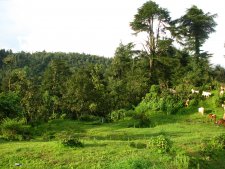Posted By Ritwick Dutta (July 20, 2008)
The benefit of Right to Information and citizens’ participation in environmental issues is not just limited to NGO’s and citizens. It can also be of great help to government officers, especially to those trying to implement the law and Judgments of Court but who face resistance from other departments.
The recent instance in the famous tea-growing Darjeeling Hills in India provides an interesting example. As the example of Darjeeling shows, the petitioner got the relief even before the case was heard by the Supreme Court special committee on Forests, in view of the strong evidence obtained through the Right to information Act, 2005.
The issue relates to an ecologically fragile part of the Himalayas located in Darjeeling viz the Senchal Wildlife Sanctuary which is home to several endangered species. A part of the Sanctuary comprising grasslands was used for dumping old vehicles by the local government, namely the Darjeeling Gorkha Hill Council. The dumping encroached upon 20 acres of land of the Protected Area. This was done in violation of the provisions of the Wildlife (Protection) Act, 1972 and even the orders of the Supreme Court.
The dumping of vehicles continued until April 2008. The forest officer in charge of the Sanctuary, Ms Sumita Ghatak, directed the Hill Council to remove the vehicles. The Hill Council resisted, and continued to dump its old vehicles thereby polluting and destroying the fragile ecology. The orders from the Forest Department not only met with strict resistance but also led to the Hill Council making a formal complaint before the government for strict action against the Forest Officer for harassment and undermining the authority of the Council.
It was at this moment that conservation groups and concerned citizens got together. Using the Right to Information Act (RTI), 2005, local citizens obtained all interdepartmental correspondence which revealed a shocking level of arrogance of the Hill Council to the provisions of law and to the orders of the Supreme Court. It was clearly seen that the manner in which the Hill Council responded to the direction of the Forest Officer, prima facie constituted contempt of the Court. The Hill Council sought to overlook the provisions of all conservation laws.
Using the various information obtained under RTI, a petition was filed by Wildlife Trust of India, a national level NGO, before the Central Empowered Committee (CEC) of the Supreme Court asking for initiation of contempt proceedings against the Principal Secretary of the Hill Council. As is required by the Court procedure, a copy of the petition was sent to the Hill Council.
Surprisingly, within three days of receiving the copy of the petition and without even the case coming up for hearing, the Hill Council wrote to the Forest officer that in view of the petition filed in the CEC, the Hill Council would like to surrender the entire 29 acres immediately and also take away all the vehicles dumped by it!
Within days (first week of May 2008), the vehicles were removed. The land is now back with the wildlife and Forest Department.
Is this a case of effective judicial remedy, or the benefits of RTI, or responsive civil society intervention? Well, it is a mix of all and the beneficiary is obviously the wildlife of Darjeeling hills which will get to munch in an extra 29 acres of grassland free of rusting vehicles!
Contributed by Ritwick Dutta (with inputs from Vyom Raghuvanshi, WTI) Ritwick (ritwickdutta@gmail.com) leads the TAI Himalayan Coalition and filed the above mentioned petition on behalf of Wildlife Trust of India.

Comments are closed.